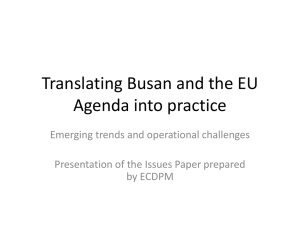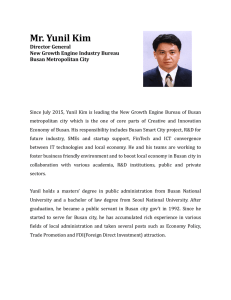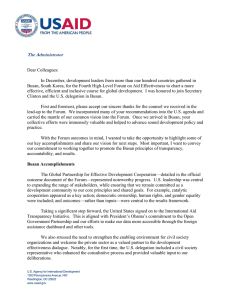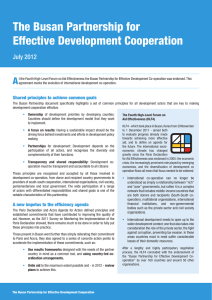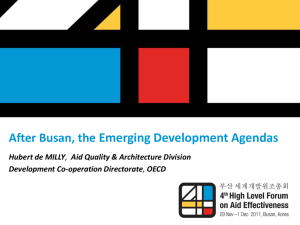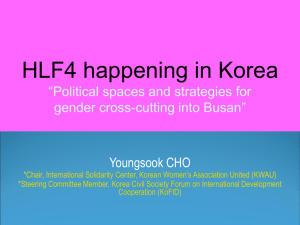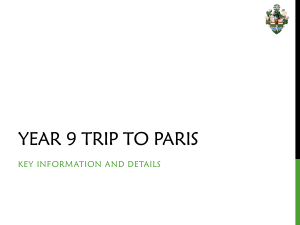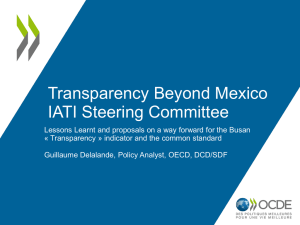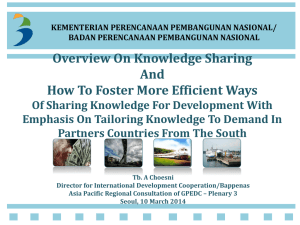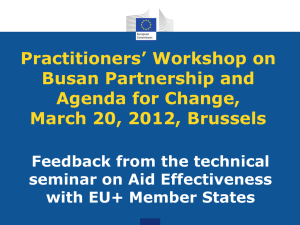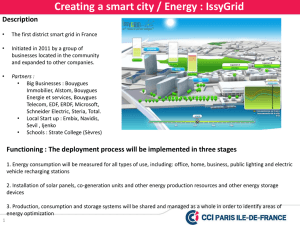Busan, 29 nov – 1 Dec 2011
advertisement
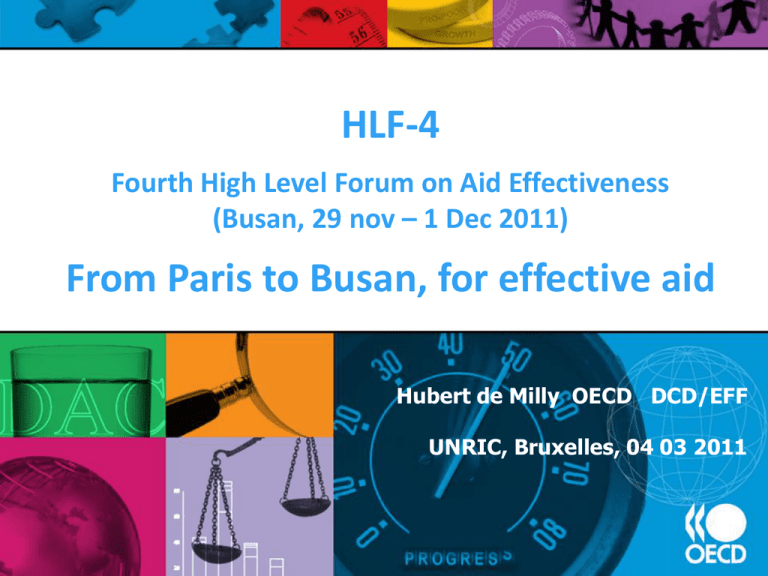
HLF-4 Fourth High Level Forum on Aid Effectiveness (Busan, 29 nov – 1 Dec 2011) From Paris to Busan, for effective aid Hubert de Milly OECD DCD/EFF UNRIC, Bruxelles, 04 03 2011 An effective menu… STARTER Monterrey Consensus………………..(2000) Rome HLF1- Harmonization …….(2003) MAIN COURSE Paris Declaration …………… (2005) Accra Agenda for Action ………….(2008) SIDE DISHES …..(All 2010) •Bogotá Statement on South South C. •Dili Declaration on Fragile states •Istanbul CSO principles DESSERT Busan HLF4 ……………… (2011) What about tomorrow’s dinner? How it started 10 years ago 2000-2002, a diagnostic: to reach MDGs, ODA is: – Part of the solution (and must be increased) – But also part of the problem (doing harm?) 2003-2005, a mutual commitment (or “trade off”): to increase aid effectiveness: – Donors relax constraints (using country syst.) – Recipients improve policies and management – Both reconvene in 2008 and 2011 2005-2010: building a comprehensive aid effectiveness agenda Paris Declaration: 5 pillars, 56 commitments, 12 indicators Accra Agenda for Action: everything that every stakeholders must do to make aid effective. Behind the scene: The WP-EFF 24 Countries receiving ODA 8 Countries both receiving and providing assistance 31 Donor countries 9 Multilateral organisations 6 International Civil institutions: CSOs, foundations, local governments, parliaments WP-EFF: a partnership to work together CHAIRS Vice Chairs EXECUTIVE COMMITTEE (26 members) WORKING PARTY PLENARY (80 participants) A Ownership & Accountability Broad-based Ownership Donor support to domestic Accountability (Govnet) Mutual Accountability at country level and international Accountability B Use of Country Systems Support implementation of commitments. C Transparent & Responsible aid Aid transparency Strengthen capacity & performance. Predictability Improve transparency on use of country systems International division of labour In-country division of labour Conditionality D Assessing Progress Monitor implementation of PD & AAA. E Managing for Development Results Evaluate implementation Document progress Monitoring the fragile states principles CSO and aid effectiveness Workstreams: TT-SSC, TT-Health as a Tracer Sector, Capacity Development… 6 Does it work? The Monitoring Survey The major strength of the PD 12 indicators, 3 surveys • 2006 baseline (2005 data) 33 participant countries • 2008 mid-term (2007 data) 54 participant countries • 2011 final survey (2010 data) 91 participant countries Donors and government complete a short questionnaire in each country, supplemented by qualitative reporting Results in June 2011. Does it work? The PD independent evaluations Phase 1 (2008) on implementation Phase 2 (2010-2011) on impact, showing (?) – Positive impact at sector level: catalysing, strengthening legitimizing coordination for greater investment, efficiency and results – Better prioritisation of country needs – Improved enabling environment for CSOs – No move to budget support, no pressure to do so 2011: a 4th HLF to do what? Stocktaking from the Paris / Accra process Agreeing on features of high quality aid and its monitoring framework towards 2015 Situating aid in its broader development context: – – – – More actors Diversified approach: MICs, LICs, FS, regions Catalyst dimension: trade, security, climate… Results and right-based approaches Who? Where? When? A political event that attracts ministerial attendance, with decisive outcomes Busan, Bexco. Host: Government of Korea At the end of this year: 29 November to 1 December 2011. Stocktaking of progress Presenting findings to HLF4 Key Messages and Recommendations Progress since Paris (PDMS+other evidence) + Country Chapters and statistical annexes Evaluation of implementation Format and Approach for HLF-4 Process – Multi-stakeholder, open and transparent – Evidence-based inputs on what really matters (drawing on monitoring and evaluation) To be decided (by mid 2011): – Type of outcome document – Main issues Format – Plenary sessions – Showcasing sessions – Interactive/political debates on a few issues… – … to complete the Busan Outcome Document. Busan HLF 4: Preliminary format Day 1:Progress Since Paris Morning Session Day 2: New Development Challenges Day 3: Actions for the Future Plenary 1: “Progress Since Paris: What lessons have we learned?” Review evidence from PD Monitoring & Evaluation Plenary 2: “Looking Forward – How can aid address emerging development challenges?” Political Debate 3: “What actions will we take now?” Interactive sessions (themes): Recommendations to Outcome Document Interactive sessions: (themes): Recommendations to Outcome Document IS Afternoon Session Ongoing 13 IS IS IS Political Debate 1: “Unfinished business: What we still need to do” •Recommendations to Outcome Document IS IS IS IS Political Debate 2: “Making development effective: What can aid do to leverage progress in development?” •Recommendations to Outcome Document Negotiation of Outcome Document Thematic Events (showcasing) •Ministers review outcome document •Combined with Tidewater meeting ? Closing Plenary : Endorse Outcome Document Timeline 2011 Jan Feb Mar Apr May Jun Jul Aug Sept Oct Nov Deadline for submission of proposed themes Menu of Options – identifies themes for events, of any kind, at HLF 4 (incl. potential organisers based on expressed interest) and of the outcome doc. Start of negotiation process. Decision on major themes for the outcome doc; attribution of responsibilities for related events [depending on state of negotiation process] Decision on interactive sessions & political debates On-site negotiation of the Busan Outcome Document: The format and link with the Political Debates will be defined in due course. * Paris-Busan, what a nice story! Aid works Aid decided by itself to overcome coordination difficulties (Paris)… … and to check the results 6 years later! What do you want Busan to bring? – A new/revised framework for aid effectiveness? – Some new reforms, within and outside aid? – Already: post 2015 (post-MDGs) ideas ?
